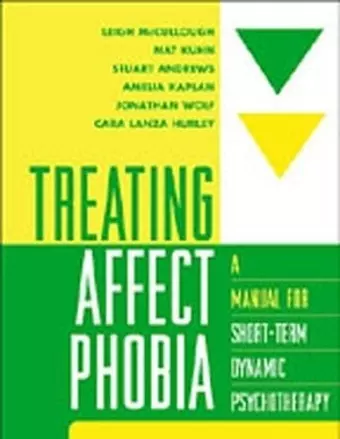Treating Affect Phobia
A Manual for Short-Term Dynamic Psychotherapy
Jonathan Wolf author Stuart Andrews author Leigh McCullough author Nat Kuhn author Amelia Kaplan author
Format:Paperback
Publisher:Guilford Publications
Published:27th Mar '03
Should be back in stock very soon

This hands-on manual from Leigh McCullough and associates teaches the nuts and bolts of practicing short-term dynamic psychotherapy, the research-supported model first presented in Changing Character, McCullough's foundational text. Reflecting the ongoing evolution of the approach, the manual emphasizes affect phobia, or conflict about feelings. It shows how such proven behavioral techniques as systemic desensitization can be applied effectively within a psychodynamic framework, and offers clear guidelines for when and how to intervene. Demonstrated are procedures for assessing patients, formulating core conflicts, and restructuring defenses, affects, and relationship to the self and others. In an easy-to-use, large-size format, the book features a wealth of case examples and write-in exercises for building key clinical skills. The companion website (www.affectphobiatherapy.com) offers useful supplemental resources, including Psychotherapy Assessment Checklist (PAC) forms and instructions.
This work is an extraordinary synthesis of depth and practicality. It is as clear, concrete, and richly exampled a treatment manual as I have seen, yet it depicts not a simple or mechanistic therapy but one that goes to the very heart of human feeling and experience. Incorporating a profoundly integrative vision, Treating Affect Phobia will be of great value not only to psychodynamically oriented therapists but to anyone in the field who appreciates the accumulating evidence for the central role of affect--and fear of affect--in our lives.--Paul L. Wachtel, PhD, Doctoral Program in Clinical Psychology, City College and the CUNY Graduate Center, New York
This is the training manual that teachers and practitioners of short-term dynamic therapy have been eagerly anticipating. It is the first psychodynamically oriented volume that expertly guides the novice through emotion-focused, time-sensitive psychotherapy in an explicit, step-by-step fashion. The manual is enhanced by very useful exercises that allow therapists to try out their interventions and compare them to the authors' expert responses. This volume represents a new and exciting development in the teaching, learning, and practice of psychodynamic/integrative therapy in general, and brief psychotherapy in particular.--Stanley B. Messer, PhD, Dean, Graduate School of Applied and Professional Psychology, Rutgers University
This is a treatment manual with a number of fabulous characteristics: it takes the astute clinical observations of psychodynamic therapists and sets them within modern principles of learning and behavioral change; it draws from the best of the behavior therapy treatments for phobias; it is beautifully clear and easy to follow; and it has comprehensive learning exercises at the end of each chapter to help the clinician actually learn how to apply the treatment in clinical practice. I plan to have my students read it.--Marsha M. Linehan, PhD, Department of Psychology, University of Washington
This carefully reasoned and researched manual starts with the simple assumption that many people are afraid of their own emotions, offers easy ways to identify whatever is being expressed or even suppressed, and explains clearly the authors' suggestions for treatment.--Donald L. Nathanson, MD, The Silvan S. Tomkins Institute and Department of Psychiatry and Human Behavior, Jefferson Medical College
- This is the training manual that teachers and practitioners of short-term dynamic therapy have been eagerly anticipating. It is the first psychodynamically oriented volume that expertly guides the novice through emotion-focused, time-sensitive psychotherapy in an explicit, step-by-step fashion. The manual is enhanced by very useful exercises that allow therapists to try out their interventions and compare them to the authors' expert responses. This volume represents a new and exciting development in the teaching, learning, and practice of psychodynamic/integrative therapy in general, and brief psychotherapy in particular. -Stanley B. Messer, PhD, Graduate School of Applied and Professional Psychology, Rutgers- --The State University of New Jersey, 1/26/2003
"This work is an extraordinary synthesis of depth and practicality. It is as clear, concrete, and richly exampled a treatment manual as I have seen, yet it depicts not a simple or mechanistic therapy but one that goes to the very heart of human feeling and experience. Incorporating a profoundly integrative vision, Treating Affect Phobia will be of great value not only to psychodynamically oriented therapists but to anyone in the field who appreciates the accumulating evidence for the central role of affect--and fear of affect--in our lives."--Paul L. Wachtel, PhD, Doctoral Program in Clinical Psychology, City College and the CUNY Graduate Center, New York
"This is the training manual that teachers and practitioners of short-term dynamic therapy have been eagerly anticipating. It is the first psychodynamically oriented volume that expertly guides the novice through emotion-focused, time-sensitive psychotherapy in an explicit, step-by-step fashion. The manual is enhanced by very useful exercises that allow therapists to try out their interventions and compare them to the authors' expert responses. This volume represents a new and exciting development in the teaching, learning, and practice of psychodynamic/integrative therapy in general, and brief psychotherapy in particular."--Stanley B. Messer, PhD, Dean, Graduate School of Applied and Professional Psychology, Rutgers University
"This is a treatment manual with a number of fabulous characteristics: it takes the astute clinical observations of psychodynamic therapists and sets them within modern principles of learning and behavioral change; it draws from the best of the behavior therapy treatments for phobias; it is beautifully clear and easy to follow; and it has comprehensive learning exercises at the end of each chapter to help the clinician actually learn how to apply the treatment in clinical practice. I plan to have my students read it."--Marsha M. Linehan, PhD, Department of Psychology, University of Washington
"This carefully reasoned and researched manual starts with the simple assumption that many people are afraid of their own emotions, offers easy ways to identify whatever is being expressed or even suppressed, and explains clearly the authors' suggestions for treatment."--Donald L. Nathanson, MD, The Silvan S. Tomkins Institute and Department of Psychiatry and Human Behavior, Jefferson Medical College-
ISBN: 9781572308107
Dimensions: unknown
Weight: 900g
365 pages